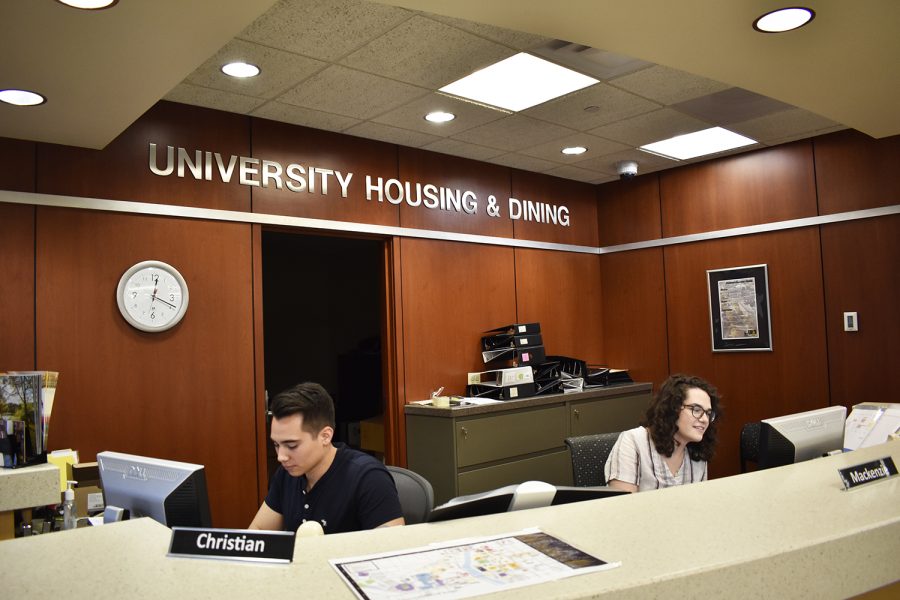UI Housing & Dining plans to improve residence-hall living
The University of Iowa Housing and Dining plans to enhance the dorm experience and create more meaningful interactions with residents and their resident assistants.
Receptionists Christian Castano and Mackenzie Goss are seen at the University Housing and Dining Administration Building on Tuesday, August 28, 2018. University Housing and Dining are in process of making changes in their Residence Education Model.
August 28, 2018
Beginning this semester, University Housing & Dining will implement a new residential curriculum, the Residence Education Model.
The model is designed to improve living on campus at the UI and advance the responsibility of the students, said Danielle Barefoot, the coordinator for curriculum and assessment in residence education at Housing & Dining.
The program is committed to helping students achieve three main goals: Learning about Self, Discovering Relationships, and Engaging in Community, she said.
The biggest changes will be in the RAs’ responsibilities and how Housing & Dining is working with campus partners and resources to connect students with experts, Barefoot said.
RAs will focus on getting to know their residents as individuals instead of lumping them into groups.
“We know that each Hawkeye is a unique person with their own experiences, values, and goals, and we are committed to supporting all of our students,” Barefoot said.
The Residence Education Model has been implemented by peer institutions such as Purdue University, the University of Illinois, and the University of Michigan.
“The new model will create a strong support system in the residence halls by requiring resident assistants to have one-on-one chats with their residents periodically, called ‘Hawk Talks,’ ” said Jocelyn Roof, an RA at Currier.
Alongside the new Residence Education Model will be an opt-out program for Living Learning Communities. In previous years, students were required to choose an LLC in each residence hall.
This year, residents were able to “opt-out” of LLCs and choose no community at all.
Amy Baumgartner, the assistant director of residence education, said living in an LLC is not an experience every student wants, but the department is happy to offer options for those who do.
“We anticipate that our LLCs will see higher student engagement, because students who are living in these communities are the ones who really want to be there,” Baumgartner said.
Roof, who is an RA on a floor without an LLC, said many of the LLCs that remain are identity-based or career- and major-focused, such as Young, Gifted, and Black, Well-Beings, and Be-WISE. Residents share a common interest, she said, and they are able to take a course in common with their dorm mates.
“Because students choose whether or not they want to participate in an LLC, their experience varies depending on which LLC they choose and how much they gain from the experience,” Roof said. “Even if students are in an LLC, there’s always the chance they aren’t actually invested in the curricula and activities of the community they chose. It all depends on how much the students buy into the programming.”
Joe Briddle, a Currier resident and first-year student, said he has liked not having an LLC far more than he thought he would.
“I have gotten to befriend people in lots of different majors and I always liked hearing about what other people are learning in their classes, so not being in a particular LLC has been great,” he said.



